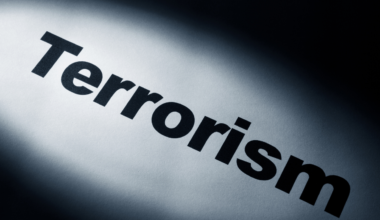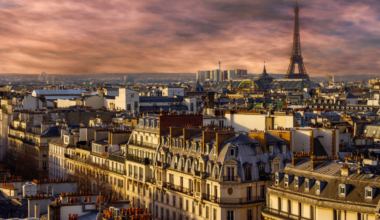Muslim ideologues, especially during the past few decades, have espoused a passion to make two assertions. One, religiously they are the superior people on the earth. Two, they are chosen by Allah to wage war to eradicate evil from the world and to invite non-Muslims to embrace Islam.

How can they expect the people of other faiths to love them when they are so proud to claim superiority on the basis of their faith and persistently tell everybody else that others are the misled people and that Muslims would show them the right path? In fact, Muslims, as a group, seem largely preoccupied to remedy a collective feeling of powerlessness and a sense of irrelevance by engaging in emotional acts of power symbolism. This as a consequence means that the political ideas dominate public imagination to the point that moral analyses and thinking have become marginalized in the contemporary Islam. This has led to the emergence of highly radicalized Islamic groups and their jarring and dogmatic ideologies end up reducing Islam to a single dynamic – the dynamic of power, which most other religious civilizations have already outlived.

There is no denying the fact that every religion’s past is stained in blood just as the human history has blood on its hands. What marks out us Muslims today is that we still take pride in that past. For example, on the Indian subcontinent Mohammed Bin Qasim is accredited with bringing Islam to India. The fact of the matter is that it was ninth attack of the Arabs on the flourishing country that exported food and grains to the world. India was a prosperous and peaceful country that had never carried out militant raids abroad. Mohammad Bin Qasim and his army, like all others of yore, plundered and slaughtered brutally. This shows how common Muslims are misled, by opportunistic leaders and the clergy, into glorifying their militancy, while most other faiths regard theirs merely as unpleasant history. Look at the respective attitude of Germans and Turks to their own holocausts during the past century. Turks still prefer to live in the denial of Armenian genocide, which was every bit as ignominious as the pogrom perpetrated by Nazis.

Herein lies the flaw. Muslims’ own approach to the world history and the aggressive media campaigns launched by their enemies have pushed today’s Muslims to the wall. They seem more concerned with justifying their past than adjusting to the present day realities. While conquering has always been a passion with the rulers, it is baffling to watch how the Muslims plead innocence for the warriors and the conquerors of half of the world from Arabian Peninsula, to Greater Mesopotamia, Africa, Europe, and Asia. There is a constant denial of viewing the ambitious invading rulers as a norm of greed and conquest, that entire human history is replete with, rather than the emblems of Islam. Every now and then you come across Muslim scholars telling the world that wherever Muslim warriors went, they went for the sake of peace and piety.

Even the relatively liberal Muslim minds betray bewilderment as to whether to own or disown their chronicle. The fact is that the Muslims invaded, fought gruelling battles, and subjugated the countries. So did everybody else. This is irrefutable history. While individual character of the leaders swayed on the armies from time to time, nobody conquered countries with bouquets of flowers. I can say from personal experience that the imaginary utopias of ideal and perfect Muslim societies in the past, as hyped by the ideologues and taught in our history textbooks, cannot survive an objective and dispassionate inspection of the history.

Several hundred years ago, Ibne Khaldun exhorted introspection upon the Muslims in order for them to understand the origin of their decline that lay in the barrenness and corruption of their social order, the gaping holes in their knowledge of statecraft, the oppression of their own armies, overweening arrogance of the rulers, and the selfishness of their nobles in utter disregard of the collective good of the people. This still rings true. Just a handful of the fifty odd Muslim countries have yet evolved a stable democratic political system. In fact most Muslim countries are dominated by self-serving corrupt elites -like Sharifs, Bhutto/Zardaris, Cahudhris, and their cohorts in Pakistan- who cynically advance their personal interests and steal resources from their people. No Muslim country has a viable educational system or a university of international stature. The countries with Muslim populations have fallen way behind the rest of the world in terms of education, science and technology. The knowledge gap between the Muslim countries and the developed world is increasing rapidly. Many emerging markets, especially those in Asia, have done much better in educating their citizens and improving the technological base of their economies than the more endowed Muslim countries.

The Muslims are believed to number over 1.5 billion. Intriguingly the large chunks of Muslim population living in non-Muslim countries are also way behind their fellow country men. The examples can range from the 130 million Muslims of India, to 60 million in China, and about 30 million in Europe. This was not always like this. Between the 9th and the 13th centuries, Muslims were the pioneers in the studies of science, philosophy, medicine etc. Science flourished because there was, within Islam, a strong rationalist tradition that stressed human free will against predestination. It was in the twelfth century that the seeds of present orthodoxy were sown by people like Al-Ghazali, who backed revelation over reason and predestination over free will. Held in the grip of orthodoxy, Islam choked. It was the end of the fertility of tolerance of divergent ideas and science in Islam.

Meanwhile the rest of world moved on. Mercantile capitalism and technological progress enabled Western countries to colonize the rest of the World, including Muslims from Indonesia to Morocco.

However, to vehement opposition from the orthodox, the logic of modernity resurfaced in the Muslim world –at least its elite thinkers during the 19th and 20th centuries were driven by a desire to adapt Islam to the call of modern era and to interpret Quran in ways consistent with the progress of science. These thinkers included Mohammed Abduh and Rashid Rida of Egypt, Sayyed Ahmed Khan and Mohammed Iqbal of India, and Jamaluddin Afghani of Iran. Till the arrival of Khomeini, not a single major political leader of the Muslims in 20th Century was a fundamentalist. These included Turkey’s Ataturk, Pakistan’s Jinnah, Iran’s Mossadegh, Algeria’s Ben Bella, Indonesia’s Sukarno, and Egypt’s Nasser. Iqbal, for instance, truly believed that Muslim thought had an almost natural assignation with modernity and –in ‘The Reconstruction of Religious Thought in Islam’ in particular- comes across as impressed by the ideals and realities of the modernity. He suggested that Islam itself looks forward to modernity, advances reason and rationality as the tools to ascertain the truth, and is open to new knowledge and innovation. Iqbal and other modernists were ardent advocates of ‘Ijtehad’ because they understood that it is in the nature of innovation to feed upon itself. Iqbal, probably being the most perspicacious of them, understood the scale of work such a reform project would entail and apparently felt inhibited by its enormity as well its sweeping consequence. Hence, unsurprisingly, he vacillates when it comes to the application of his modernist vision and does not explain how he expects a far-reaching and different understanding of the entire corpus of early Islamic works to take place without internalizing modernity.

At the same time the West plumped for the leaders willing to further its objectives, even the ultraconservative and repressive Islamic regime of Saudi Arabia. As the cold war heated up, the independent minded Muslim leaders became intolerable for the West. Mossadegh was overthrown. Britain targeted Nasser. Indonesia’s Sukarno was ousted after a bloody coup. The West’s favourite regimes were pressed from outside and corrupt from within. No wonder, ruling through tyranny, they proved unequal to the task of defending national interests and ensuring social justice. This left a vacuum that Islamic forces began to fill. For example after the elimination of Bhutto, Zia-ul-Haq ruled Pakistan for eleven years. Unfortunately, after the invasion of Afghanistan by the USSR, the West opted for the religious as its foremost ally –against communism- in the Muslim world. Islamic holy warriors from all over the Muslim world were co opted by the US-led West in its war on communism. Mullahs obsessed with medieval concepts of life and transported by martyrdom were touted as ‘freedom fighters’ and feted on the lawns of White House. Hence the West has to understand why the Muslims today find extremists’ political message –and not necessarily their religious extremism- easy to relate to. It is about time to stop propping up corrupt, hypocritical, and tyrannical regimes across the world just because they are perceived to serve the US and Western interests.

However, only Muslims can help their predicament. First of all they should shake off the downward spiral of self-pity in perceiving themselves as helpless target of an all powerful and malicious West. They have to realize that Muslims’ golden era had already ended well before the age of commercial imperialism. The causes for Muslims’ decline were effectively internal and call for a lot of introspection on the part of Muslims to understand what went wrong.
Secondly they have to understand that today’s Muslim nations are much bigger and quite dissimilar to insular and homogenous tribal society in Arabia over 1400 years ago. Hence the Sharia laws formulated some 1200 years ago cannot be used to run a modern state. They need to be synchronized with time and human development. Today the religions and spiritual thoughts are best thriving in secular and democratic states. Religious freedom, human dignity, rule of law, and the participation of people in the governance have played an important role in all the societies that have made the most significant progress over the last couple of centuries. To acknowledge this, for Muslims, would amount to facing up to and rejecting the wisdom of most orthodox Islamic scholars according to which in an Islamic state the sovereignty can only be exercised by the representatives of Allah, such as Khilafat-al-arz or Vilayat-e-Faqih.

It is also very harmful to look up to the extremists in desperation. These mislaid ideologues or bigots cannot offer an alternative. They are possessed by hatred that after the demise of communism has turned towards the West. Apart from targeting Christians, they have perpetrated unremitting slaughter of different Muslim sects and Ahmadis in their places of worship in Pakistan, and of other minorities in other Muslim countries. This amply bears out that today’s Islamic extremism cannot be mistaken as the revolt of the cast out. . More than inspiring piety or dictating individual conduct it is about gaining control and power. In fact, this is primarily what motivates all extremism including religious fundamentalism. Remember Christian clergy’s crusades, ‘Reconquista’, assurances of indulgence, and massacres of sects like Cathari? Remember all Muslim clergy –which has never agreed on much except punishing heresy by death, slavery, concubines, and male supremacy- was vehemently united in stamping out ‘Mutazilites’? As soon as rationalism started making inroads into Muslim thought, the Mullah fought back and, unfortunately, triumphantly so. The examples include Asharite revolt, Ghazali’s renunciation of our greatest minds like Al-Kindi, Al-Razi, Averroes, Avicenna, and Ibn Khuldun, Ibn Taimaiya’s call for ‘Salafism’, and Majlisi’s rejection of Mir Dimad and Mulla Sadra. After the Crusades and then the annihilation of Baghdad at the hands of Hulagu, the power in Muslim empires always cosseted Mullahs and thus formed the nexus that we have for decades witnessed as ‘Military and Mosque alliance’ in Pakistan. The brilliant writer Amin Maalouf in his remarkable book ‘The Crusades through Arab Eyes’ gives an account of the decline of Muslim thought and intellect that rings true even today. For example at one place Maalouf writes: “Although the epoch of the Crusades ignited a genuine economic and cultural revolution in Western Europe, in the Orient these holy wars led to long centuries of decadence and obscurantism. Assaulted from all quarters, the Muslim world turned in on itself. It became over-sensitive, defensive, intolerant, and sterile – attitudes that grew steadily worse as world-wide evolution continued. Henceforth progress was the embodiment of ‘the other’. Modernism became alien.” Fundamentalism has also been often used by liberals (including people like Jinnah, Ayub, Bhutto, Benazir, and Musharraf in Pakistan) for their own goals. After the disappearance of Muslim empires, this nexus distilled into imperialists’ ties with the fundamentalists. For example, i) Khomeini’s mentor, Ayatollah Kashani, sided with the British and Americans to topple Mossadegh and ii) fundamentalists waged West-sponsored Jihads against numerous regimes round the world. In his book Ethics of Belief, William Kingdom Clifford has cited, as an example, the story of a ship owner who knew his ship required extensive repairs but –each time the thought occurred to him- would decide to hold off the expense, thinking that it had survived many voyages and that God would not allow it to sink with so many passengers on board. When one day the ship went down in mid-ocean, drowning a many aboard, he had no qualms in collecting the insurance. Most wardens of the Ummah in the recent past have been no different from this ship owner.

Religion must be viewed as a powerful tool to inspire or dictate a better human conduct among its followers. However, the collective human survival lies in acknowledging that religion or the nationalism are not a solution for the political and societal challenges facing us. Both are divisive and conflict-ridden. Besides they are used to inculcate in us the false notions of superiority and arrogance that pull people apart and are difficult to surmount even at individual levels. A democracy with a strong social conscience, liberty of thought and faith, and secular humanism constitute the way forward. Only the societies based on freedom, equality, logic, and reason can offer the hope of providing everyone with basic rights, liberty, and pursuit of knowledge for the sake of life. While the religion can play a positive influence in shaping individual lives and societies, it must be purged of closed fundamentalist mind. No individual or group has the right to set itself up as the sole authentic spokesperson for Islam. So dear friends, even if none of us is enlightenment incarnate in the mould of Voltaire, at our levels, in the cosy settings of our drawing rooms or in public, we must continue to argue ceaselessly against the forces of stupidity and tyranny as there is some responsibility on our part to confront and expose the flimsy theological and textual bases of fundamentalist arguments. Failing to repudiate the strident voices of extremism in our midst will be tantamount to a failure to fulfil our responsibility at this important moment in history. We are all under obligation to restore the image of our faith and traditions by living by attitudes, mindsets, and behaviours that are just, civilized, humane, and compassionate and by persuasively speaking out against the support for all forms of terrorism, hatred, and violence in our midst.

The writer is the author of four books that can be seen at https://www.amazon.com/Asif-Zaidi/e/B07J2S7R11







